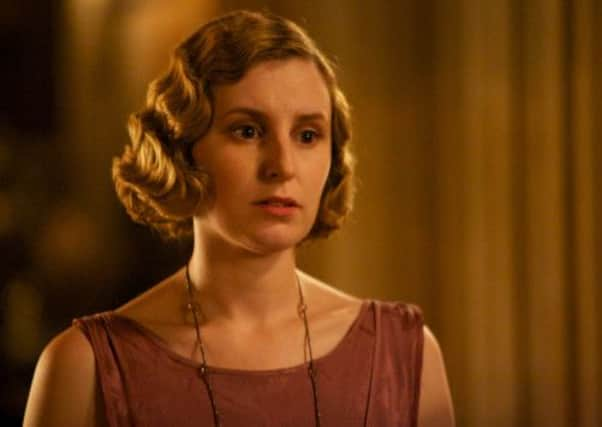Jayne Dowle: Downton’s cosy past still has plenty to teach us


Lizzie, my seven-year-old, likes this game too. And her favourite time to play it is when we’re watching Downton Abbey, ITV1’s period drama, now back for its fourth series.
Usually, Lizzie is either Daisy the put-upon housemaid or Lady Edith, the newspaper columnist and quiet rebel. It’s not hard to see where she gets that from.
Advertisement
Hide AdAdvertisement
Hide AdSay what you like about the suitability of this as television for seven-year-olds, but it’s better than the American teen pap they would watch round the clock if left in charge of the remote. And yes, I know it’s on late on a Sunday night, but that’s what the record button is for.
Love it or loathe it, you can’t deny that Downton brings the past to life. A sanitised version, I grant you. There’s no mud in Downton. No noisome smells from Edwardian plumbing. No mould spreading across the ceiling and down the walls in the west wing.
Sometimes it’s an illogical, random version of the past. Characters pop up, seemingly crucial to plot development, only to disappear, never to be seen again. There must be an attic full of them somewhere.
Things happen that would never have happened “in real life”. Like when the late Lieutenant Matthew Crawley spent more time making doe-eyes at Lady Mary across the dinner table than chasing the Hun on the Western Front. He came back crippled for life, only to walk again within months and father a son when doctors said there was no hope. Mmm.
Advertisement
Hide AdAdvertisement
Hide AdThe occasional leaps of faith we are required to take make Dallas look like Jane Austen. But those who dismiss it for such transgressions should remind themselves that it’s not supposed to be real. It’s en-ter-tain-ment.
And as Lizzie and I know, it does have a clear moral purpose. Through watching Downton, she has learnt that it was common for women to die in childbirth. She knows about suffragettes and why we must never take the vote for granted. She has had an insight into shell-shock. And she now knows what the inside of a workhouse looks like.
One storyline in the new series, involving an old friend of the butler Carson, was set in Ripon Workhouse.
When I told her that her great-great-grandfather died in a similar institution in Barnsley, Lizzie’s eyes grew very wide. That’s quite a lot of history for a seven-year-old to take in.
Advertisement
Hide AdAdvertisement
Hide AdIf it wasn’t for Downton though, how would she begin to wonder? She won’t learn it at school, not with a timetable packed with literacy and numeracy targets and SATs.
Children learn about history by asking things, discussing, empathising and comparing their own experiences.
What especially fascinates Lizzie is how everything was paid for. She asks a simple question such as “who buys Lady Edith all those dresses?” And it turns into a rambling conversation about owning land, the rights of women to work, dressmakers and whether it’s right to use peacock feathers in hats.
It also prompts some interesting discussions about class. The evil nanny in the new series torments little Sybbie for being the daughter of an Irish chauffeur.
Advertisement
Hide AdAdvertisement
Hide AdTry explaining the full nuances of that to a seven-year-old. I’m not expecting her to understand all the possible ramifications, but it’s good that we are starting that level of debate now.
She’s also fascinated by what we might call “the relationships”. Especially among the servants. The idea of leaving your home and family to go and live in a big house miles away is riveting enough to a modern child. The idea of then getting romantically involved with someone is almost too exciting to bear.
Currently, we are harbouring a joint crush on the very tall footman, Alfred. We’re hoping that this series, he finds the girl he so deserves. I accept this sounds hopelessly drippy. I tell you what though, I’d rather Lizzie start to explore her feelings about boys by watching this with me than learning about them entirely through playground taunts and peer pressure.
For as long as I can, I’ll convince her that romance hasn’t been entirely stamped out by sexting and semi-pornographic Facebook “selfies”.
Advertisement
Hide AdAdvertisement
Hide AdWhen the first boy breaks her heart I’m hoping that the full box-set of every series of Downton, plus Christmas specials, will help her get over it.
When we watch, we see that everything we go through has been experienced before; lost love, family strife, social and political upheaval. And perhaps that’s the most important thing about Downton Abbey.
It might not change the face of television. It might not unite the nation on a Sunday night. It might send husbands scurrying for their sheds. It might not even make sense some of the time. But Downton still tells us more about ourselves than we realise.